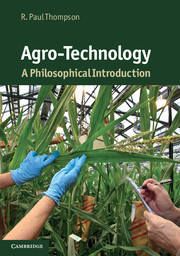Book contents
- Frontmatter
- Contents
- List of figures
- List of tables
- Preface
- Introduction
- 1 Scientific background
- 2 Application of genetics to agriculture
- 3 Philosophical and conceptual background
- 4 The controversy
- 5 The controversy
- 6 The controversy
- 7 The organic alternative
- 8 Impacts on low- and middle-income countries
- Concluding remarks
- Bibliography
- Index
6 - The controversy
Purported harms
Published online by Cambridge University Press: 05 June 2012
- Frontmatter
- Contents
- List of figures
- List of tables
- Preface
- Introduction
- 1 Scientific background
- 2 Application of genetics to agriculture
- 3 Philosophical and conceptual background
- 4 The controversy
- 5 The controversy
- 6 The controversy
- 7 The organic alternative
- 8 Impacts on low- and middle-income countries
- Concluding remarks
- Bibliography
- Index
Summary
The potential benefits of GM agriculture are, for the most part, not at issue in the debate, although whether it is appropriate to call some of them benefits, as I and many others claim, is contested by some critics. The central focus of critics is on harms. Three broad factions can be discerned. One faction stridently opposes GM, claiming real and serious harms exist that outweigh any claimed benefits. As one would expect, there is a spectrum of views within this faction, ranging from characterising the harms as catastrophic to simply unacceptable even given the benefits. A second faction cautiously accepts that the benefits are significant enough to outweigh the harms. The positions of those in this faction encompass one or more of: (1) a reluctant willingness to endure the harms (or risk of harms) to secure the benefits, (2) an unconcerned acceptance of the harms (or risk of harms), (3) a belief that the harms are serious but still outweighed by the benefits, and (4) a belief that the harms are not significant. Those in the third faction consider a significant fraction of the claims about harms to be exaggerated or outright false – a large subset of this faction think the claims are no more than disinformation and propaganda.
Some of the perceived harms are broader than GM agriculture but amplified by it; some others are specific to GM agriculture. The broad harms involve the perceived negative impact of economic globalisation, the power of multinational corporations and agri-business conglomerates, and the overly rapid deployment of innovations in science and technology. Specific harms include loss of heritage plants, effects of GM crops on non-target species, development of resistance in target pests to the toxin a plant has been engineered to express, horizontal gene transfer (HGT), introduction of new allergens and carcinogens, and changes in nutrient bioavailability. Generally, the broad harms flow from economic structures and forces, and from the relentless, and bumpy, social transformation wrought by science and technology. These are dealt with in Section 6.1. Mostly, the specific harms focus on environmental harms (dealt with in Section 6.2) and health harms (dealt with in Section 6.3).
- Type
- Chapter
- Information
- Agro-TechnologyA Philosophical Introduction, pp. 152 - 177Publisher: Cambridge University PressPrint publication year: 2011

